
The shark is a moth of the family Noctuidae. The species was first described by Carl Linnaeus in his landmark 1758 10th edition of Systema Naturae.
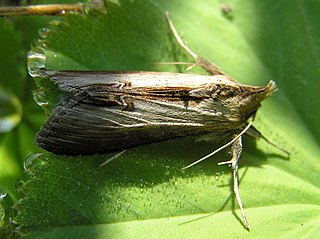
Cucullia asteris, or star-wort, is a moth of the family Noctuidae. The species was first described by Michael Denis and Ignaz Schiffermüller in 1775. It is found through the Palearctic including Japan.

Cucullia chamomillae, the chamomile shark, is a moth of the family Noctuidae. The species was first described by Michael Denis and Ignaz Schiffermüller in 1775. It is found in Central Europe, Southern Europe, the Near East and North Africa.

Cucullia is a genus of moths of the family Noctuidae. The genus was erected by Franz von Paula Schrank in 1802.

Cucullia lactucae, the lettuce shark, is a moth of the family Noctuidae. The species was first described by Michael Denis and Ignaz Schiffermüller in 1775. It is found in most of Europe, Turkey, the Caucasus and east across the Palearctic to the Altai Mountains. In the Alps it rises to 1,800 metres (5,900 ft). It is found mainly in barren places, on weeds and debris and scree corridors on slopes, shrubby edges and in vineyards, gardens and parks.
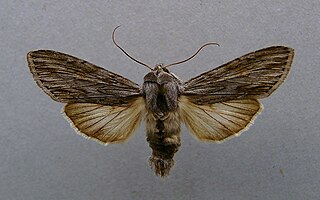
Cucullia lucifuga is a species of moth of the family Noctuidae. It is found in north, central and southern Europe east to Japan. It is also present in Tibet and Armenia.

Cucullia absinthii, the wormwood, is a moth of the family Noctuidae. The species was first described by Carl Linnaeus in 1761. It is found from Europe to the Caucasus, Turkey, northern Iran, western Siberia, the Altai Mountains, Tien-Shan and Tarbagatai.
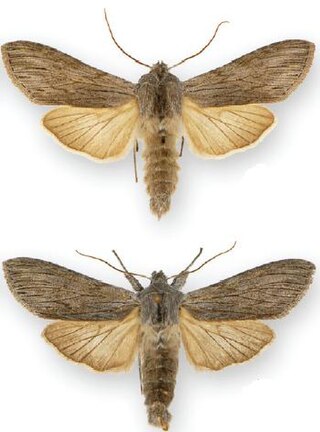
Cucullia intermedia, the dusky hooded owlet, intermediate cucullia, goldenrod cutworm or intermediate hooded owlet, is a moth of the family Noctuidae. The species was first described by Adolph Speyer in 1870. It is found from coast to coast across southern Canada and the northern United States, south in the west to California and to Pennsylvania in the east. In the Rocky Mountains it is found south to the White Mountains in east-central Arizona and occurs commonly in Utah, Colorado and north-eastern Nevada.
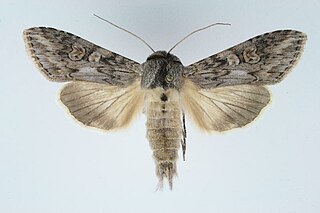
Cucullia artemisiae, or scarce wormwood, is a moth of the family Noctuidae. The species was first described by Johann Siegfried Hufnagel in 1766. It is found from central and southern Europe to Turkey and across the Palearctic to western Siberia, Central Asia, Manchuria, the Korean Peninsula and Japan.
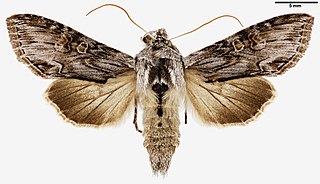
Cucullia gnaphalii, the cudweed, is a moth of the family Noctuidae. It is found from most of Europe to Turkey, Transcaucasia, Mongolia and Sayan.
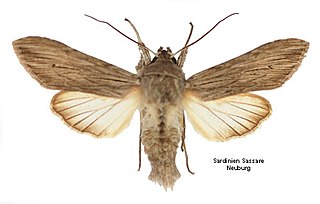
Cucullia tanaceti is a moth of the family Noctuidae. The species was first described by Michael Denis and Ignaz Schiffermüller in 1775.

Cucullia splendida is a species of moth of the family Noctuidae first described by Caspar Stoll in 1782. It is found in Russia and parts of Africa, Asia and America.
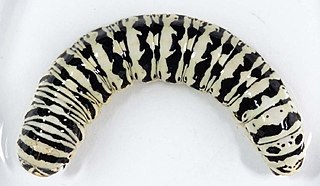
Cucullia speyeri, common names Speyer's paint, Speyer's cucullia or Speyer's hooded owlet moth, is a moth found in North America. It is found from Alberta and Montana to the Atlantic coast from New Hampshire to Virginia. It was described by Joseph Albert Lintner in 1874. In the US state of Connecticut, it is listed as a species of special concern and is believed to be extirpated. The habitat consists of open meadows, dry grasslands and native prairies.
Cucullia omissa, known generally as the omitted cucullia or Alberta falconer, is a species of moth in the family Noctuidae. It is found in North America.
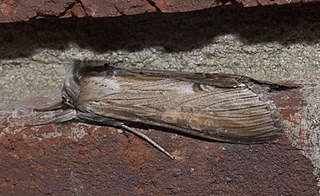
Cucullia asteroides, known generally as the goldenrod hooded owlet or asteroid moth, is a species of moth in the family Noctuidae. It is found in North America.

Cucullia praecana is a moth belonging to the family Noctuidae. The species was first described by Eduard Friedrich Eversmann in 1844.
Cucullia balsamitae is a moth belonging to the family Noctuidae. The species was first described by Jean Baptiste Boisduval in 1840.
This page is based on this
Wikipedia article Text is available under the
CC BY-SA 4.0 license; additional terms may apply.
Images, videos and audio are available under their respective licenses.















